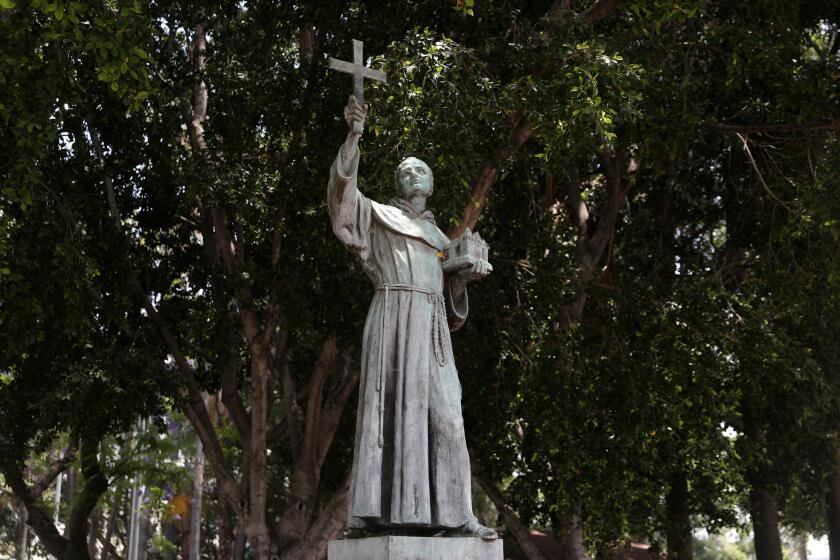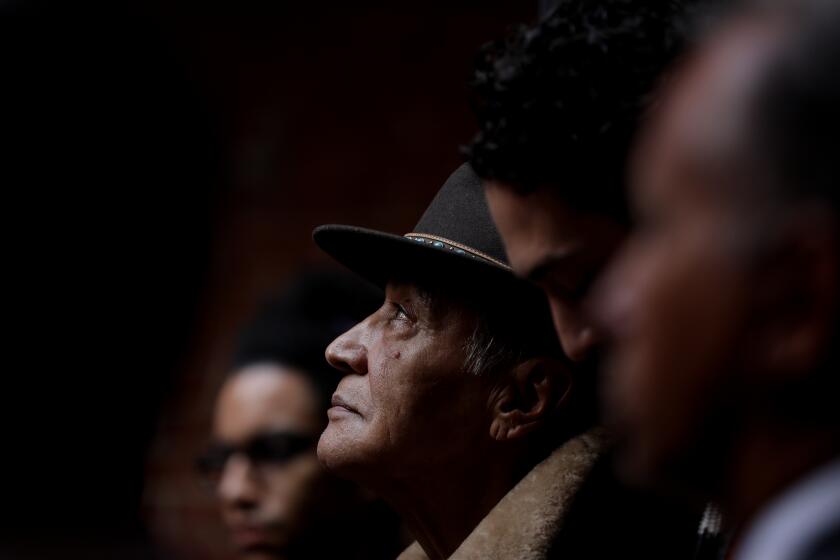To address past injustices against Native people, we must move beyond renaming holidays

- Share via
Narratives about Native Americans have progressed in California and the nation in recent years, a start to setting aside stereotypes and false histories that have perpetuated in U.S. culture. This progress tends to be noticed more frequently in the fall, first with more critical dissection of Columbus Day, which many cities, including Los Angeles, are ditching for Indigenous Peoples’ Day.
Then comes the official federal designation of November as Native American Heritage Month and Thanksgiving. Along with the advancement of more historically accurate portrayals of the original thanksgiving, there are growing calls for educators to dispense with the usual Thanksgiving activities that inevitably trot out the worst of the many American Indian stereotypes.
But we cannot just rename a holiday here and have a land acknowledgment there and be satisfied that the nation’s abysmal history and continuing injustices toward Native people are resolved. Those who want to think that we live in the greatest democracy on the planet, even though we habitually lie about our nation’s genocidal foundation, need to look beyond these initial steps and determine what accountability looks like.
The first Thanksgiving I remember, I was in the second grade.
The injustices suffered by Native people are embedded in the social fabric and legal systems of the United States. They have allowed unwanted oil pipelines to be permitted on treaty-protected tribal lands, such as President Trump’s go-ahead for the Keystone XL and Dakota Access pipelines and the Minnesota portion of Enbridge Line 3, which President Biden failed to halt.
But that is just the tip of a much larger iceberg for American Indians, and especially for California Indians because of the state’s particularly brutal history of genocide and land theft. There is an existing historical infrastructure in our state and in our country that maintains enormous and deadly disparities in health, education, crime, environmental justice, religious freedom and more.
These structures have created a complex spectrum of California Indian experiences and identities. There are nearly 200 tribal groups in California — including 109 federally recognized tribes, at least 77 federally unrecognized tribes, and thousands of individuals who are California Native but not enrolled in a federally recognized or non-recognized tribe. This fragmentation results in an unequal distribution of resources, including the retention of ancestral lands and access to social services, education and economic development opportunities.
Despite its considerable shortcomings, California is trying to lead other states in its efforts to look at accountability. In 2019 Gov. Gavin Newsom passed executive order N-15-19, which includes an official apology to California Indians for the state’s “attempted destruction” of California’s Indigenous people.
California struggles to reconcile Saint Serra with terrible mission-era injustices toward Native Americans. L.A.’s renaming of a park and Newsom’s signature on a bill to honor the state’s Native Americans are good steps toward healing.
But this is only a start. As organizations in California, including museums, government agencies, and colleges and universities move toward understanding and dismantling infrastructures of genocide, they must elevate California Indian expertise and experiences when developing their goals and strategies. They need to change existing systems to ones that lead with accurate representation and compensate Native people for their labor. Complex subjects such as land return should be addressed with ongoing summits between state and tribal leaders as well as historians and other experts.
Recent examples of California tribal land reacquisition can serve as models for future land return in the state. In 2015 nearly 700 acres of land on the Northern California coast were returned to the Kashia Band of Pomo Indians through a partnership with the Trust for Public Lands. Last year one of the Esselen tribes reacquired almost 1,200 acres on the Big Sur coast through a $4.5-million grant from the California Natural Resources Agency.
Institutions should use as a guidepost the United Nations Declaration on the Rights of Indigenous Peoples (UNDRIP), which the United States is a signatory to. This would include finding ways to create institutional practices that uphold Indigenous rights to self-determination and cultural identity as well as full consent on development projects that affect tribes. Additionally, there should be safeguards from discrimination and for protection of sacred sites outside reservation boundaries. This was done when UNDRIP was successfully invoked by the Yocha Dehe and Cortina Band of Wintun tribes to protect a sacred site through creation of the Sogorea Te Land Trust in the East Bay in 2011.
Father Serra Park in downtown Los Angeles will be renamed in consultation with Native American tribes.
Organizations will need to consult tribal community voices for their expertise, either by putting them on staff or by including money in their budgets for consultation fees. And they will need to create ways to put into practice truth and reconciliation efforts by acknowledging the real histories of California tribes.
In some cases this means examining their own histories and admitting wrongdoing in the past. Efforts to learn, respect and follow tribal cultural protocols should be standard practice for institutions looking to remedy past harms against Native people.
California’s recent actions are signs of progress. But they can be seen only as the beginning of repair if the state means to establish a truly just relationship with California Indians.
Joely Proudfit, Luiseño/Payómkawichum, is chair of American Indian studies and director of the California Indian Culture and Sovereignty Center at Cal State San Marcos. Dina Gilio-Whitaker, Colville Confederated Tribes, is a lecturer of American Indian studies at California State University San Marcos and an independent consultant on American Indian environmental justice policy issues. Nicole Lim, Pomo, is a lecturer of American Indian studies at California State University San Marcos and executive director of the California Indian Museum and Cultural Center.
More to Read
A cure for the common opinion
Get thought-provoking perspectives with our weekly newsletter.
You may occasionally receive promotional content from the Los Angeles Times.











